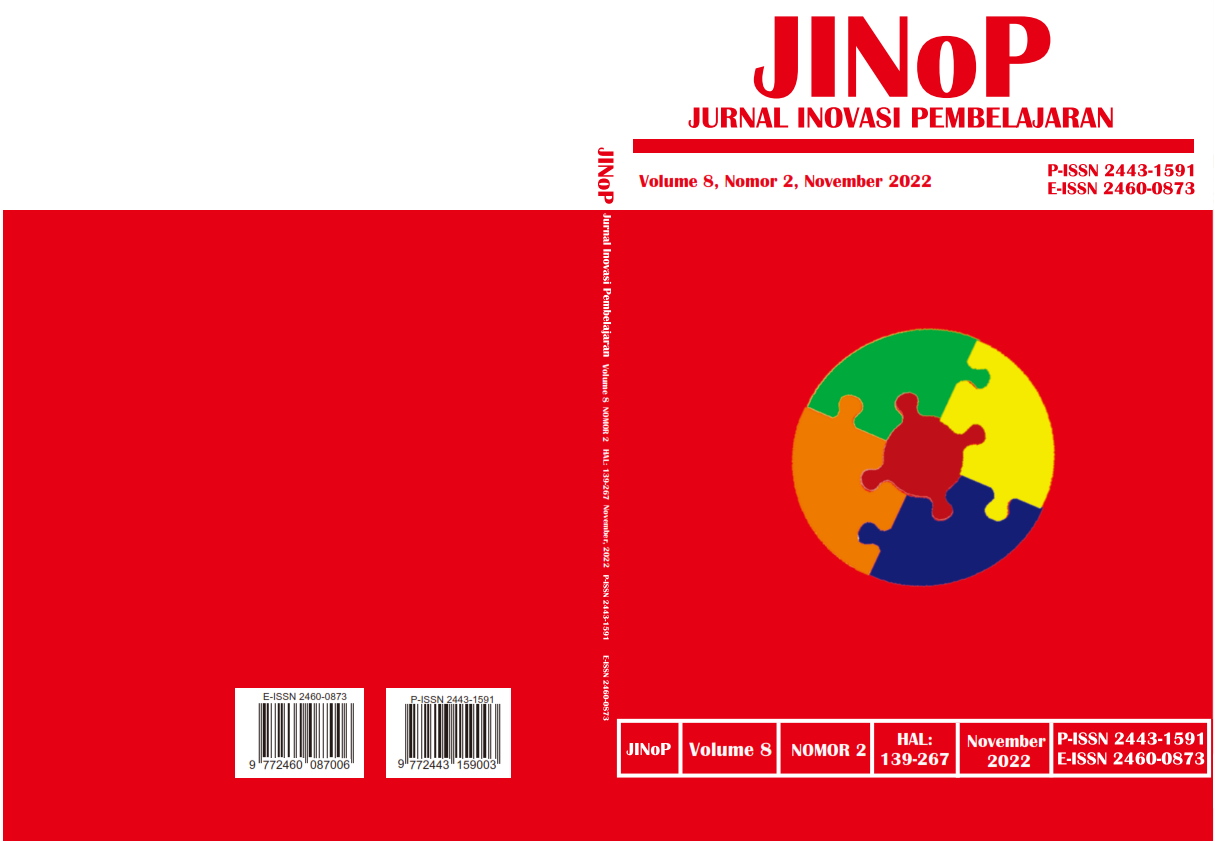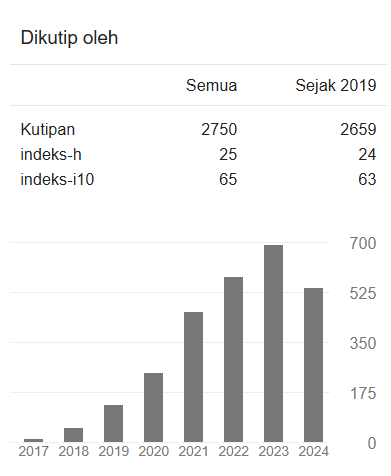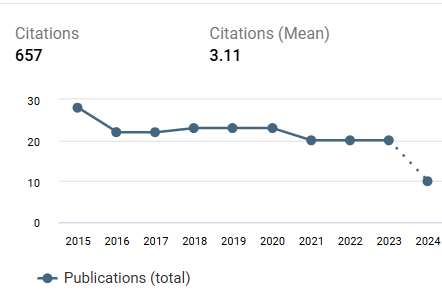Pemanfaatan Aplikasi Mindjet Mindmanager dalam Meningkatkan Literasi Materi Pembelajaran IPS
DOI:
https://doi.org/10.22219/jinop.v8i2.22812Keywords:
Literacy, Social Sciences Learning Materials, Mindjet MindmanagerAbstract
The online learning system has an impact on student learning patterns, especially when the lecturer only assigns students to answer questions that do not require them to be skilled in thinking as a result, students do not understand the learning material and indicate that they are only at the performative and functional literacy level. This study aims to find out how the use of the Mindjet Mindmanager application can be used as a medium to improve student literacy in social sciences learning materials. The study used a quantitative descriptive method with 35 respondents from Tadris IPS IAIN Parepare students in the first semester. The results showed that the literacy level of Tadris IPS IAIN Parepare students changed with the difference between the pre-test and post-test items for performative items 2.14, functional 0.69, informational 4.77, and epistemic 3.4. This is because the mindjet mindmanager application requires students to find keywords from what they read and connect one concept to another in describing a topic of social sciens learning materials.
Downloads
References
Agra, G., Formiga, N. S., Oliveira, P. S. de, Costa, M. M. L., Fernandes, M. das G. M., & Nóbrega, M. M. L. da. (2019). Analysis of the concept of Meaningful Learning in light of the Ausubel’s Theory. Revista Brasileira de Enfermagem, 72, 248–255.
Al-Tabany, T. I. B. (2017). Mendesain Model Pembelajaran Inovatif, Progresif, Dan Konteksual. Prenada Media.
Anggraini, R., Febriana, W. S., Mufarohah, L., Sari, I. P., & Saputra, N. D. (2021). Proses dan Minat Belajar Mahasiswa dalam Pembelajaran Online di Era Pandemi Covid-19. Jurnal Interaksi: Jurnal Ilmu Komunikasi, 5(2), 201–212.
Atsani, K. L. G. M. Z. (2020). TRANSFORMASI MEDIA PEMBELAJARAN PADA MASA PANDEMI COVID-19. Al-Hikmah: Jurnal Studi Islam, 1(1), 82–93.
Chiou, C. (2008). The effect of concept mapping on students’ learning achievements and interests. Innovations in Education and Teaching International, 45(4), 375–387.
Dahar, R. W. (2011). Teori-teori belajar dan pembelajaran. Jakarta: Erlangga, 136, 141.
Engko, C., & Usmany, P. (2020). Dampak pandemi covid-19 terhadap proses pembelajaran online. Jurnal Akuntansi, 6(1), 23–38.
Fahrudin, A. (2017). Perbedaan hasil belajar matematika siswa yang diajarkan menggunakan quantum learning teknik mind mapping dengan cooperative learning teknik jigsaw di SMP Negeri 18 Tangerang. Keberlanjutan: Jurnal Manajemen Dan Jurnal Akuntansi, 1(2), 51–58.
Fathurrohman, M. (2015). Model-Model Pembelajaran. Jogjakarta: Ar-Ruzz Media.
Gazali, E. (2018). PESANTREN DI ANTARA GENERASI ALFA DAN TANTANGAN. 2(2), 94–109.
Hidayat, T., & Asyafah, A. (2019). Konsep Dasar Evaluasi Dan Implikasinya Dalam Evaluasi Pembelajaran Pendidikan Agama Islam Di Sekolah. Al-Tadzkiyyah: Jurnal Pendidikan Islam, 10(1), 159–181.
Masni, H. (2017). Strategi meningkatkan motivasi belajar mahasiswa. Jurnal Ilmiah Dikdaya, 5(1), 34–45.
Moore, R. L. (2020). Developing lifelong learning with heutagogy: contexts, critiques, and challenges. Distance Education, 41(3), 381–401.
Muchsini, B., & Siswandari. (2020). Class culture and the academic stress of digital natives generations. Cakrawala Pendidikan, 39(1). https://doi.org/10.21831/cp.v39i1.26910
Mulyasa, H. E. (2017). Pengembangan dan implementasi kurikulum 2013.
Nugraha, M. T. (2017). Budaya Literasi Dan Pemanfaatan Sosial Media Pada Masyarakat Akademik. Dalam Jurnal Pemikiran Pendidikan Islam At-Turats, 11(2), 124–132.
Putri, E. A. R. (2021). Perbedaan Efektivitas Pembelajaran Berbasis Platform Whatsapp Group dan Google Meet pada Siswa di Masa Pandemi Covid-19. Edukatif: Jurnal Ilmu Pendidikan, 3(6), 4456–4469.
Rahayu, A. P. (2021). Penggunaan Mind Mapping dari perspektif Tony Buzan dalam proses pembelajaran. Vol, 11, 65–80.
Ramli, N. L. (2022). Podcast Kearifan Lokal sebagai Media Penguatan Karakter Mahasiswa. J-PIPS (Jurnal Pendidikan Ilmu Pengetahuan Sosial), 8(2), 126–135.
Ridwan, S. (2019). Intellectual capital dan knowledge management dalam inovasi dan kreasi media pembelajaran berbasis kemampuan 4c dan literasi. Proceedings of the ICECRS, 2(1), 75–81.
Saomah, A. (2017). Implikasi Teori Belajar Terhadap Pendidikan Literasi. Medan: Http://Repository. Usu. Ac. Id.
Silberman, M. L. (2020). Active learning 101 cara belajar siswa aktif.
SirotovÁ, M., MichvocÍKovÁ, V., & Rubacha, K. (2021). Quasi-experiment in the educational reality. Journal of Education Culture and Society, 12(1), 189–201.
Suragangga, I. M. N. (2017). Mendidik lewat literasi untuk pendidikan berkualitas. Jurnal Penjaminan Mutu, 3(2), 154–163.
Susanto, H. (2016). Membangun budaya literasi dalam pembelajaran bahasa Indonesia menghadapi era mea. JP-BSI (Jurnal Pendidikan Bahasa Dan Sastra Indonesia), 1(1), 12–16.
Tarmidzi, T. (2019). Belajar Bermakna (Meaningful Learning) Ausubel Menggunakan Model Pembelajaran dan Evaluasi Peta Konsep (Concept Mapping) Untuk Meningkatkan Kemampuan Pemahaman Konsep Mahasiswa Calon Guru Sekolah Dasar Pada Mata Kuliah Konsep Dasar IPA. Caruban: Jurnal Ilmiah Ilmu Pendidikan Dasar, 1(2), 131–140.
Uno, H. B., & Mohamad, N. (2011). Belajar dengan pendekatan PAILKEM. Jakarta: Bumi Aksara.
Waluyo, M. E. (2014). Revolusi Gaya Belajar untuk Fungsi Otak. Nadwa, 8(2), 209. https://doi.org/10.21580/nw.2014.8.2.577
Warsono, H., & Hariyanto, M. S. (2012). Pembelajaran aktif teori dan asesmen. Bandung: PT Remaja Rosdakarya.
William, W., & Hita, H. (2019). Mengukur Tingkat Pemahaman Pelatihan PowerPoint Menggunakan Quasi-Experiment One-Group Pretest-Posttest. Jurnal SIFO Mikroskil, 20(1), 71–80.
Downloads
Published
How to Cite
Issue
Section
License
Copyright (c) 2022 Ramli et al

This work is licensed under a Creative Commons Attribution 4.0 International License.
Copyright Notice
Authors who publish with JINoP (Jurnal Inoasi Pembelajaran) agree to the following terms:
- For all articles published in the JINoP (Jurnal Inovasi Pembelajaran), copyright is retained by the authors. Authors give permission to the publisher to announce the work with conditions. When the manuscript is accepted for publication, the authors agree to the automatic transfer of the publishing right to the publisher.
- Authors retain copyright and grant the journal the right of first publication with the work simultaneously licensed under a Creative Commons Attribution 4.0 International License. that allows others to share the work with an acknowledgment of the work's authorship and initial publication in this journal.
- Authors are able to enter into separate, additional contractual arrangements for the non-exclusive distribution of the journal's published version of the work (e.g., post it to an institutional repository or publish it in a book), with an acknowledgment of its initial publication in this journal.
- Authors are permitted and encouraged to post their work online (e.g., in institutional repositories or on their website) prior to and during the submission process, as it can lead to productive exchanges, as well as earlier and greater citation of published work (See The Effect of Open Access).








